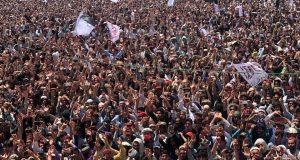 The relation between the Islamic States of Afghanistan and Pakistan is a complicated love affair. In public, both countries claim being brothers sharing various cultural, linguistic and historic relations; in private, however, their policy makers may do whatever evil fits their purpose for their so called “strategic interests”. And when relations soar, Pakistan is quick to point fingers to the nearly 3 million Afghan refugees living in Pakistan and consider them to be the source of all evils Pakistan face. Ironic this is as Pakistan overlooks the significant contributions Afghan refugees have made and still make to the economy of Pakistan.
The relation between the Islamic States of Afghanistan and Pakistan is a complicated love affair. In public, both countries claim being brothers sharing various cultural, linguistic and historic relations; in private, however, their policy makers may do whatever evil fits their purpose for their so called “strategic interests”. And when relations soar, Pakistan is quick to point fingers to the nearly 3 million Afghan refugees living in Pakistan and consider them to be the source of all evils Pakistan face. Ironic this is as Pakistan overlooks the significant contributions Afghan refugees have made and still make to the economy of Pakistan.
Nearly 5-6 million Afghan refugees left Afghanistan to live in Pakistan in the 1980s. Most of these Afghans were cramped into refugee camps living in dire circumstances. The beliefs and needs of the young Afghan men there were exploited to force them to become holly worriers in the Afghan Jehad against the Soviet Union. No Pakistani fought the Soviets but did receive the Arab’s and the West’s payments for disbursing to the Afghan refugees and the so called “freedom fighters” as they wished. They were successful in spreading the Jehad ideology and in training and equipping the Mujaheedins. In essence, it was the Afghans receiving casualties; the Pakistani’s receiving dollars. And that then resulted in Pakistan developing a nuclear bomb! Pakistan forgets or deliberately rejects this favor.
Most of the Afghan refugees sent relatives to the West as either immigrants or refugees. These Afghans in the west then sent in remittances that their relatives in Pakistan spent on housing, education, clothing and food – all rented out or bought from the Pakistani markets. Whole new cities, such as Hayatabad in Peshawar were built to profit on the Afghan refugees’ money. Pakistan forgets this too.
Many Afghan are traditional entrepreneurs that brought in their capital and assets to Pakistan. Afghan businesses in carpets, precious stones, marbles and others sector directly contributing to bringing in more revenues to Pakistan. The Pakistanis were so happy for this as they voluntarily distributed national identity cards to the Afghan Entrepreneurs to cap on their capital and profits. They also even named Afghan rugs as made in Pakistan! Pakistani’s usually forget this too.
In addition, Afghans living in Pakistan receive no support from the Pakistani State either as resettlement allowances, refugees’ grants or food stamps to live on! Most Afghans have their own small businesses and work hard to earn a living. Keeping the contributions to the GDP of Pakistan aside, these Afghans contribute services to the economy there too. Pakistani’s forget this too.
In the past 10-15 years, Pakistan has built many hospitals in Pakistan that solely run on Afghans seeking better health services in Pakistan. Millions of dollars are spent by the Afghans in Pakistan on health care facilities that only very rich Pakistani’s could afford. Not just hospital, Afghans uses local transportation, guest houses and medicine, not for free. Pakistan forgets this too.
And on top of all of the above, Afghanistan imports most of its domestic consumption needs from Pakistan reaching millions of dolloars a year. Many Pakistani and Afghan traders deal on daily basis in which Pakistan mostly recieves cash and Afghans the Pakistani products albeit of import quality only. Some of the Afghan refugees living in Pakistan facilitates these trade relations. Pakistan forgets this too.
Now, whenever anything bad happens in Pakistan, Afghan refugees are the scapegoat to point at despite them having nothing to do with those issues and contributing so generously to that country’s economy. And the irony is that many of the Pakistani people, frustrated with the incompetence and dictatorship of their government, agree to it and are fooled in to the propaganda.
The writer is an Afghan analyst on the socio-economic and political affairs of Afghanistan. Moheb received a Master in Public Policy (M.P.P.) and a Graduate Certificate in Good Governance Afghanistan from Willy Brandt School of Public Policy at the University of Erfurt, Germany and holds a B.A. in Economics from Kabul University and Bard College in New York as a Fulbright Scholar.
THE PASHTUN TIMES
 Pashtun Times Latest News
Pashtun Times Latest News




